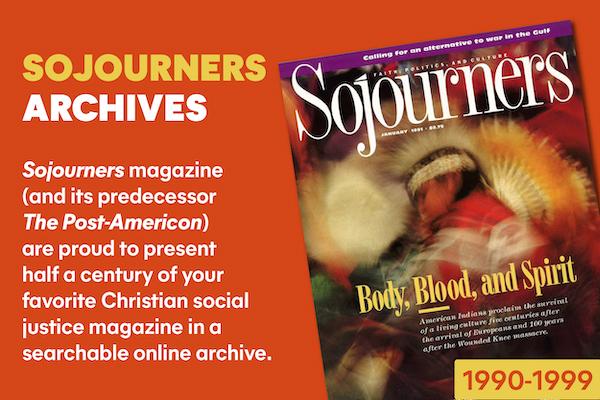During the 1960s, Jesse Helms, then a TV-station executive in Raleigh, North Carolina, delivered nightly editorials decrying the "special rights" sought by participants in the civil rights movement. His opinion, he insisted, had nothing to do with racism; it was simply a matter of opposing "preferential treatment" for blacks.
Echoes of Helms' rhetoric were heard in Colorado this fall as voters on November 3 approved Amendment 2, designed to strip away legal protection for gay men and lesbians. "Our objective has never been to discriminate," said Will Perkins, head of Colorado for Family Values, the conservative group that sponsored the ballot measure. "Our position is that sexual orientation is not an acceptable criterion for special rights."
The Colorado amendment, however, had nothing to do with "special" rights. Amendment 2 repealed local bans in Denver, Boulder, and Aspen on discrimination based on sexual orientation, and bars the passage of similar laws. Protection from discrimination is not a special right--but special vigilance, as unfortunately has been shown, is required in its defense.
Immediately following the vote, gay and lesbian institutions and individuals reported an outbreak of hate violence, including broken car windows outside gay bars, bomb threats at gay bookstores and community centers, and the firing of gay workers. In all, 23 hate crimes were reported in the two weeks after the election.
Gay rights groups fear that the measure will provoke more violent attacks and further discrimination in housing and employment. Gay men were the victims of three separate murders in the months before the election, and another man was shot to death after his assailants, who thought he was gay, shouted anti-gay slurs. "I can tell you, our community does not feel safe," Susan E. Anderson of Denver's Gay and Lesbian Community Center told The New York Times following the vote.
Even apart from the threat of violence, the vote was disturbing to many Coloradans. Glenda Russell, a Denver psychologist, told the Times, "I don't think the voters understand how painful this is--to be told that you're inferior, a second-class citizen." Lawrence Pacheco, a 23-year-old who two years ago was beaten severely with a brick, said of the vote, "I feel like I've been kicked in the stomach. Do they really hate us that much? I'm a human being, not some kind of deviant."
THE RELIGIOUS right was a key player in the passage of the amendment, and promises more of the same in other states in the months and years to come. Colorado for Family Values, Amendment 2's sponsor, is an offshoot of the California-based, anti-gay rights Traditional Values Coalition, and includes on its executive and advisory boards representatives of right-wing groups such as Concerned Women for America, the Eagle Forum, Focus on the Family, and Summit Ministries.
Members of Pat Robertson's Christian Coalition played an active role in promoting the amendment in churches and elsewhere--and were even more central in the organizing of Oregon's Ballot Measure 9, which failed on November 3. The Oregon Citizens Alliance, affiliated with Robertson's organization, was sponsor of the Oregon measure that would have banned anti-discrimination laws and mandated that public schools teach that homosexuality is "abnormal, wrong, unnatural, and perverse." Leaders of most Oregon churches--including every mainstream Protestant denomination and the state's two Catholic dioceses--played a leading role in opposing the anti-civil rights amendment.
Church opposition in Colorado, however, was less vigorous. While many denominational leaders did come out against the amendment--and United Methodist Bishop Roy Sano strongly urged all 290 UMC ministers in the state to oppose it--the Catholic Church in Colorado refused to take a position on the ballot measure in the wake of the Vatican document this summer opposing such civil protection for gays. Bishops Walter Sullivan of Richmond, Virginia, Thomas Gumbleton of Detroit, and retired Bishop Charles Buswell of Pueblo, Colorado, have--courageously and publicly--stood in opposition to the Vatican's statement, and in so doing have provided an example for other church leaders to follow.
Regardless of what position churches have taken on other questions concerning gays and lesbians, intolerance and bigotry involve fundamental issues of justice and require forceful and definitive response. Churches have a special responsibility to play an active role in the battle against anti-gay discrimination, both because of the primary role the Religious Right plays and because of the moral, ethical, and even theological nature of the human rights struggle that is at stake.
Churches should take a leadership role in calling for an amendment to the federal Civil Rights Act to include protection for gay men and lesbians--which would invalidate local measures like Colorado's Amendment 2. People of faith committed to justice should also prepare to actively engage the Religious Right as fundamentalists in other states seek to make a moral and biblical case for discrimination in the months ahead.
The issue of non-discrimination, of course, raises significant, challenging, and largely unresolved questions for the church itself. We must ask ourselves, What does it mean to truly welcome people into the family of faith? What are the implications of a non-discriminatory stance for church policies and structures? And, finally, how do we move from an ideological or dogmatic approach to these questions to one based on Christian compassion and pastoral sensitivity? The answers will only emerge as we are able to break through the bitter hostility that now characterizes the discussion and genuinely open our hearts to engage in authentic, open-minded dialogue as sisters and brothers.
Jim Rice is editor of Sojourners.

Got something to say about what you're reading? We value your feedback!
